
James Maitland "Jimmy"Stewart was an American actor and military officer. Known for his distinctive drawl and everyman screen persona, Stewart's film career spanned 80 films from 1935 to 1991. With the strong morality which he portrayed both on and off the screen, he epitomized the "American ideal" in the mid-twentieth century. In 1999, the American Film Institute (AFI) ranked him third on its list of the greatest American male actors. He received numerous honors including the AFI Life Achievement Award in 1980, the Kennedy Center Honor in 1983, as well as the Academy Honorary Award and Presidential Medal of Freedom, both in 1985.

Arthur William Matthew Carney was an American actor and comedian. A recipient of an Academy Award, a Golden Globe Award, and six Primetime Emmy Awards, he was best known for his role as Ed Norton on the sitcom The Honeymooners (1955–1956).
The year 1940 in film involved some significant events, including the premieres of the Walt Disney films Pinocchio and Fantasia.
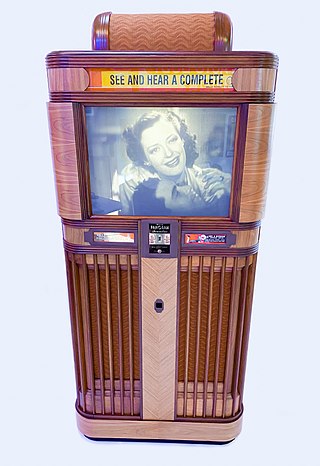
A soundie is a three-minute American musical film displaying a performance. Soundies were produced between 1940 and 1946 and have been referred to as "precursors to music videos". Soundies exhibited a variety of musical genres in an effort to draw a broad audience. The shorts were originally viewed in public places on "Panorams": coin-operated, 16mm rear projection machines. Panorams were typically located in businesses like nightclubs, bars, and restaurants. Due to World War II, Soundies also featured patriotic messages and advertisements for war bonds. More adult shorts, such as burlesque and stripteases, were produced to appeal to soldiers on leave.
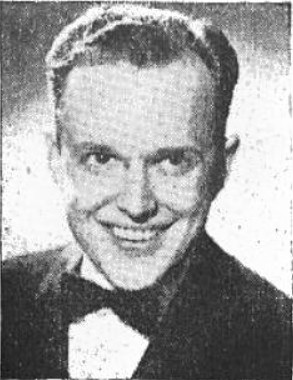
Wilbur Schwichtenberg, known professionally as Will Bradley, was an American trombonist and bandleader during the 1930s and 1940s. He performed swing, dance music, and boogie-woogie songs, many of them written or co-written by Don Raye.

"I'm a Little Teapot" is an American novelty song describing the heating and pouring of a teapot or a whistling tea kettle. The song was originally written by George Harold Sanders and Clarence Z. Kelley and published in 1939. By 1941, a Newsweek article referred to the song as "the next inane novelty song to sweep the country".
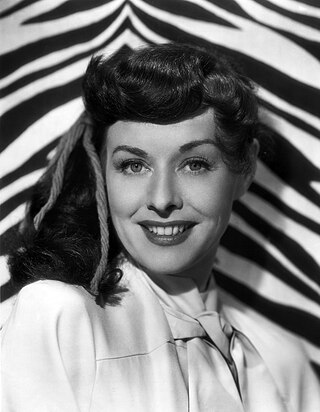
Paulette Goddard was an American actress and socialite. Her career spanned six decades, from the 1920s to the early 1970s. She was a prominent leading actress during the Golden Age of Hollywood.
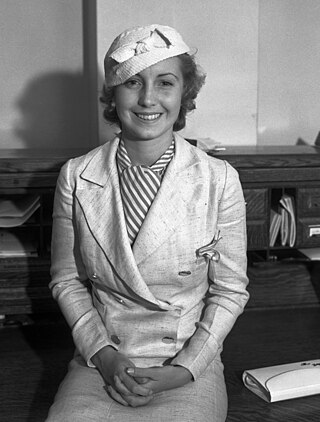
Martha Tilton was an American popular singer during America's swing era and traditional pop period. She is best known for her 1939 recording of "And the Angels Sing" with Benny Goodman.

Stephen McNally was an American actor remembered mostly for his appearances in many Westerns and action films. He often played hard-hearted characters, criminals, bullies, and other villains.
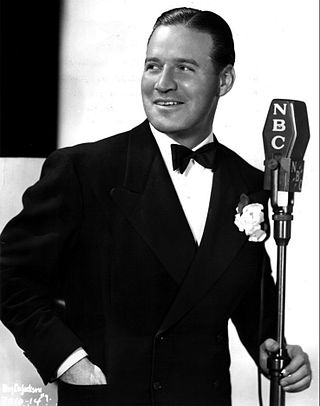
Horace Heidt was an American pianist, big band leader, and radio and television personality. His band, Horace Heidt and his Musical Knights, toured vaudeville and performed on radio and television during the 1930s and 1940s.
Whitey's Lindy Hoppers was a professional performing group of exceptional swing dancers that was first organized in the late 1920s by Herbert "Whitey" White in the Savoy Ballroom and disbanded in 1942 after its male members were drafted into World War II. The group took on many different forms and had several different names and sub-groups, including Whitey's Hopping Maniacs, Harlem Congeroo Dancers, and The Hot Chocolates. In addition to touring nationally and internationally, the group appeared in several films and Broadway theatre productions. Dorothy Dandridge and Sammy Davis Jr. were among the group's celebrity regulars.

The King Sisters were an American big band-era vocal group, appearing as a trio or quartet. Six sisters were in the group at one time or another: Alyce, Donna, Luise, Marilyn, Maxine, and Yvonne King.
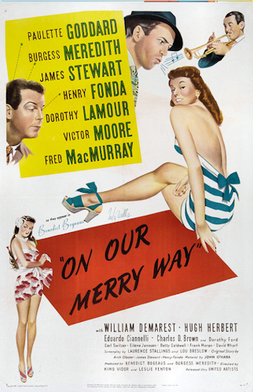
On Our Merry Way is a 1948 American comedy film produced by Benedict Bogeaus and Burgess Meredith and released by United Artists. At the time of its release, King Vidor and Leslie Fenton were credited with its direction, although the DVD lists John Huston and George Stevens, who assisted with one of the segments, as well. The screenplay by Laurence Stallings and Lou Breslow, based on an original story by Arch Oboler, is similar in style to that of Tales of Manhattan (1942), another anthology film made up of several vignettes linked by a single theme. The picture stars Paulette Goddard, Burgess Meredith, James Stewart, Henry Fonda, Harry James, Dorothy Lamour, Victor Moore and Fred MacMurray. It marks the first joint movie appearance of Stewart and Fonda, who play a pair of musicians in their section of the film.

The Scarlett O'Hara War is a 1980 American made-for-television drama film directed by John Erman. It is based on the 1979 novel Moviola by Garson Kanin. Set in late 1930s Hollywood, it is about the search for the actress to play Scarlett O'Hara in the much anticipated film adaptation of Gone with the Wind (1939). This film premiered as the finale of a three-night TV miniseries on NBC called Moviola: A Hollywood Saga.
Pot o' Gold was radio's first big-money giveaway program, garnering huge ratings within four weeks of its 1939 debut. The program kept so many listeners at home and away from movies that "some theater owners offered $1,000 prizes to anyone who was called while attending the movies."
Johnny Standley was an American musician, actor, and comedian.
The Cappy Barra Harmonica Band was an American harmonica ensemble — originally a trio, then a quartet, then two groups — that played big band arrangements. Cappy Barra flourished from 1935 to 1945.

Diane Jergens was an American film and television actress.
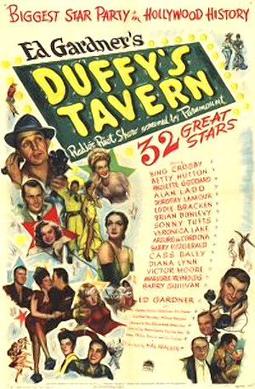
Duffy's Tavern is a 1945 American comedy film directed by Hal Walker and written by Melvin Frank and Norman Panama. The film stars Ed Gardner, Bing Crosby, Betty Hutton, Paulette Goddard, Alan Ladd, Dorothy Lamour, Eddie Bracken and Brian Donlevy. The film was released on September 28, 1945, by Paramount Pictures.

Dixon Howard "Dick" Hogan was an American actor of the 1930s and 1940s. During his 12-year career he appeared in over three dozen films, in roles which varied from unnamed bellhops to featured and starring roles. His final film performance was as the murder victim in Alfred Hitchcock's Rope (1948).
















